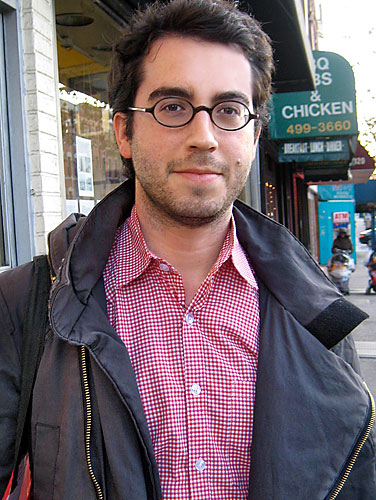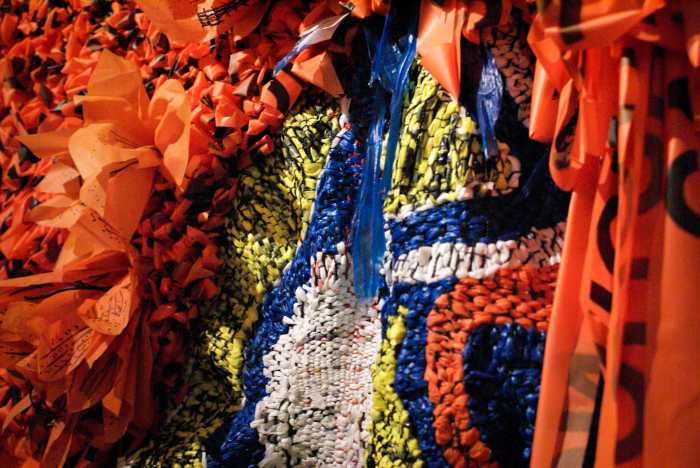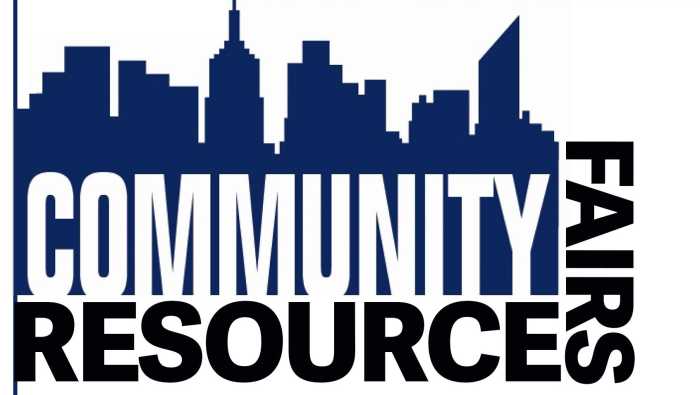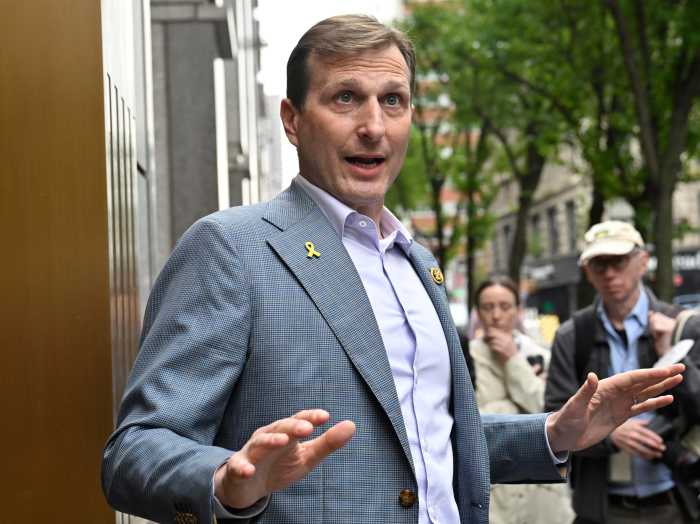I ordered the chicken sandwich. Now, such a decision rarely involves self-doubt, but when dining with novelist Jonathan Safran Foer — whose new book, “Eating Animals,” consists of 300 pages of hand-wringing against the consumption of meat — there’s nothing simple about the words, “I’ll just have the Tuscan chicken, please.”
Yet Foer’s reaction during a recent lunch at Sweet Melissa Patisserie near the author’s Park Slope home, was anything but put off. Despite having written one of the most eloquent, compelling, slam-dunk arguments against eating animals, Foer is no proselytizer. And his book is not a Bible, but a sober exploration of why he no longer wants to play even a small role in propping up our nation’s meat-industrial-political complex.
“I never actually [tell people to stop eating meat],” he said, despite suggesting in the book that friends should never let friends eat factory-farmed meat. “I know that I should, but my interest is in having people eat less of it. Telling people they should eat less of something is usually not a good way of having them actually decrease their consumption.”
So I order the chicken, which is an odd choice given how the 32-year-old Foer — the greatest writer of his generation, thanks to the 2002 masterpiece “Everything is Illuminated” and the 2005 near-masterpiece, “Extremely Loud and Incredibly Close” — deftly used his novelistic eye to describe just how disgusting the modern factory farm is.
After slaughter, the still-warm chickens, for example, are cooled in huge tanks of refrigerated water — water that some call “fecal soup” because there’s actual chicken feces in it.
Oh, it gets worse.
The food industry wants the birds cooling in water instead of air because while they’re cooling, chicken carcasses absorb this “fouled, chlorinated” fecal soup. Up to 11 percent of a chicken’s mass at the supermarket is this very water.
Obviously, the food industry could ensure that chickens are always cooling in pristine water, but given the demands of processing billions of chickens every year, doing so would take time and cost money. And there goes your 49-cent McChicken.
Or, as Foer puts it in the book, “S—t became a problem when Americans decided we wanted to eat more meat than any other culture in history and pay historically little for it.”
And yet I enjoyed my chicken sandwich, even though I know what is in it. Apparently, I’m the exception, Foer said.
“I just got an e-mail from [a powerful Hollywood writer-director] who said, ‘I haven’t eaten meat since I read your book. I love meat, but the fecal water killed it for me.’ You see, it wasn’t the environment or the suffering of the animals. It was the feces in the food he eats that got him to give up meat.”
Such “re-Foer-mations” are becoming more than just stray bits of dialogue in the great modern American liberal conversation. Natalie Portman famously posted that the chapter in “Eating Animals” about manure leeching into rivers “changed me from a 20-year vegetarian to a vegan activist.”
And one “prominent environmentalist,” Foer said, not revealing the green goddess’s name, also said the book changed her forever.
“She wrote me — this huge environmentalist! — and said that she couldn’t give a s—t about animals, but now has basically stopped eating meat because of what she learned about the environmental toll from my book,” he said. “She said she was simply unaware of the effects of factory farming on the environment.”
I choked on my chicken. How is it possible that this woman, whose name Foer shared with me, was not aware?
“How is it possible?” he asked. “How is it possible that Al Gore never talks about factory farming, when the United Nations says it is responsible for 51 percent of greenhouse gas emissions? How is it possible that you will never see the word “meat” and “Copenhagen” in the same sentence? It’s crazy. It produces more greenhouse gas emissions than everything put together.”
In other words, people like Al Gore know, but they choose to forget to avoid alienating potential allies in their current battle — the fight against industrial and vehicular greenhouse emissions. And then the rest of us, I said as I downed the last bite of my sandwich, know and just don’t care.
Foer disagreed: “It’s not an intellectual issue. If you go to a factory farm and you see a pregnant pig in a crate so small that it can’t turn around, it’s just wrong. It’s fundamental. It’s not a progressive, liberal, East Coast value. Ninety-six percent of Americans think animals deserve legal protection. So it does matter how we treat them.”
Does it? It certainly doesn’t matter to the factory farmer — one of whom speaks quite eloquently in the book about the small role he plays in feeding the world. To him, a pig in a crate is not a moral issue. It’s food.
“It’s a bad mistake to confuse something unpleasant with something wrong,” the farmer says.
Foer, of course, has made the personal decision and he’s sticking with it. “For me, it’s about the kind of civilization we want to create,” he said. “There are people who would be indifferent to cracking open a conscious monkey’s skull and eating the brain. Is that person wrong? Maybe we can’t say that, but I do know that it’s wrong for me.”
Yes, Jonathan Safran Foer misses a good steak. He said it. But for him, the key for the future of humanity is to simply stop seeking to gratify all of our worst cravings just because we can.
“I love having sex, and I love it a lot more than I like having a steak,” he said. “But I curtail that craving. I don’t act on it whenever I feel like it.”
It’s not a perfect metaphor, given that you need two willing partners to tango. All Foer would need to do to satisfy the craving for a steak is to order one.
The philosophy student in him kicked in again. “That’s just because society is structured the way it is now, but two hundred years ago, I could have enslaved a human being if I craved doing that. Fortunately, we decided that that was wrong.”
Jonathan Safran Foer’s “Eating Animals” is available at BookCourt [163 Court St. between Pacific and Dean streets, (718) 875-3677] and Greenlight Books [686 Fulton St. between S. Elliott Place and S. Portland Avenue in Fort Greene, (718) 246-0200). A full transcript of this interview is available at BrooklynPaper.com.

























